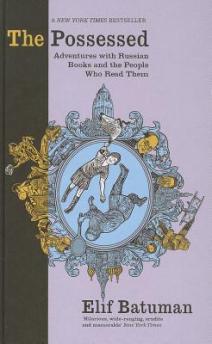
The subtitle of Elif Batuman’s 2010 The Possessed promises ‘Adventures with Russian books and the people who read them,’ so one would be forgiven for assuming this to be a critical assessment of Russian literature, with some reception studies thrown in, done in an accessible manner for the general reader. What it turns out to be is a tour through Elif Bateman’s protracted and charmed career as a post-graduate at Stanford as she studies Russian and Uzbek fiction, attends conferences and travels a lot. She has a remarkable facility for snagging tuition funding and travel bursaries, and makes the most of them, so we learn as much about her and her various boyfriends as we do about the objects of her studies; hence the Granta edition markets the book as memoir rather than literary criticism.
The title The Possessed sounds like horror fiction, but is taken from an alternative title of Dostoyevsky’s novel Demons, and sums up the attitude of many Russian authors, readers and critics. There is certainly something about Russian literature that is like no other. In passing, the reader is introduced to a variety of Russian and Uzbek writers, some at greater length than others, notably Babel (subject of a hilarious chapter as Batuman is involved in organising a conference about him at Stanford to which his nightmarish surviving relatives are invited, and finds an intriguing connection to King Kong), Tolstoy (subject of another amusing conference at Yasnaya Polyana), Chekhov, Pushkin, Dostoyevsky, Turgenev, and a number of less-well-known writers.
The critical musings offer some fascinating insights, but all too soon it is back to Batuman’s own adventures. An extended discourse on Anna Ioannovna’s ice palace is included it seems because Batuman was in St Petersburg to write an article about a recreation of it for the New Yorker (though for once the editor would not spring for travel expenses). What she does admirably is show the pointlessness of much that passes for academic discourse, while herself making a living from it. At the conference of International Tolstoy Scholars she makes the unlikely case, based on circumstantial evidence, that Tolstoy was murdered. Such speculation is actually more interesting than some of the papers presented by her fellow scholars who tend to foster fierce and inconsequential rivalries, be socially awkward, and somewhat detached from reality – unlike Elif of course. As one might expect from the title, Dostoyevsky is treated in more depth than some of the other writers, particularly a section towards the end prompted by a trip to Florence (nice) to research a magazine article on Dante in which she recounts the plot of Demons in unnecessary detail.
The Uzbek section, mainly dedicated to showing how eccentric the country, its denizens and its writers are, is much longer than it needed to be, and more space devoted to Russian authors, which let’s face it one is actually likely to read, would have been preferable. The Uzbek adventure (‘Summer in Samarkand’) is broken into three parts, otherwise it would have unbalanced the book which would consequently have required a different title. There is a good account of Uzbek history, but really we mainly learn that Uzbek literature is less interesting than Russian. Batuman finishes her stint disillusioned with the place, considering the country like a ‘worse-off’ Turkey (no wonder Old Uzbek has a hundred words for ‘crying’).
Early on in her studies Batuman reached a fork, debating whether to become a novelist or an academic, and there is an account of attending a writers’ workshop in New England where you can smell the damp earnestness and see how too easily they constrain talent as much as foster it. She chose the other path, finding herself a Russian specialist via linguistics, and in the process learning more of value to the writer than is generally found in creative writing workshops. As she is now a novelist, it seems she chose wisely, as she got the best of both worlds, but it feels a bit of a waste of academic opportunities somebody else might have utilised better. Still, she has an interest in literary aspects of double-entry bookkeeping so she can be content that her efforts and the money of others have been balanced by her achievements.
While not what I was expecting, The Possessed is an enjoyable read and I came away knowing more about Russian and Uzbek literature and history than before, as well as about René Girard and his theory of mimesis, which had an unaccountable influence on Batuman until she realised its shortcomings. However, the book is impressionistic and jumps about as she pursues her somewhat aimless postgraduate studies. Anyone hoping for a systematic analysis of aspects of Russian fiction will be disappointed. This is mainly a calling card for Batuman’s literary aspirations. It is often very funny, both in terms of the people she meets and her own academic practice, but would have been a better book if it had been more focused on the subject the subtitle suggests it will be about.
One amusing moment was a mention of Batuman trying to visit Gorky’s house in Moscow but, having written the address down incorrectly, finding herself in a Yolki-Palki, ‘one of a chain of affordable nineteenth-century-themed taverns’ and wondering why Gorky’s house had been turned into a Yolki-Palki. Having the correct address (which was not difficult) I did visit Gorky’s splendid house on a visit to the city, and can inform her that she missed an absolute treat.
